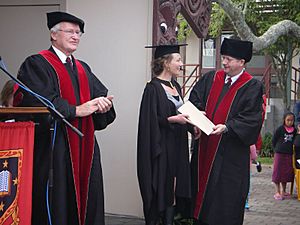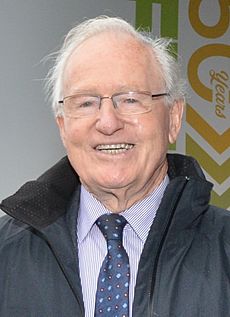Jim Bolger facts for kids
Quick facts for kids
Jim Bolger
|
|
|---|---|
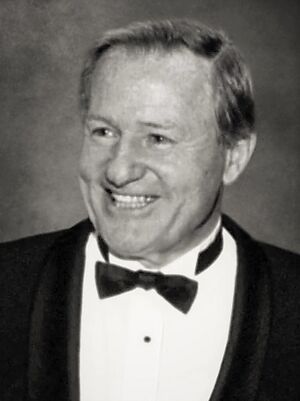
Bolger in 1992
|
|
| 35th Prime Minister of New Zealand | |
| In office 2 November 1990 – 8 December 1997 |
|
| Monarch | Elizabeth II |
| Deputy | |
| Governor-General | |
| Preceded by | Mike Moore |
| Succeeded by | Jenny Shipley |
| 7th Leader of the National Party | |
| In office 26 March 1986 – 8 December 1997 |
|
| Deputy |
|
| Preceded by | Jim McLay |
| Succeeded by | Jenny Shipley |
| 25th Leader of the Opposition | |
| In office 26 March 1986 – 2 November 1990 |
|
| Prime Minister |
|
| Deputy |
|
| Preceded by | Jim McLay |
| Succeeded by | Mike Moore |
| 27th Minister of Labour | |
| In office 13 December 1978 – 26 July 1984 |
|
| Prime Minister | Robert Muldoon |
| Preceded by | Peter Gordon |
| Succeeded by | Stan Rodger |
| 39th Minister of Immigration | |
| In office 13 December 1978 – 12 February 1981 |
|
| Prime Minister | Robert Muldoon |
| Preceded by | Frank Gill |
| Succeeded by | Aussie Malcolm |
| 1st Minister of Fisheries | |
| In office 8 March 1977 – 13 December 1978 |
|
| Prime Minister | Robert Muldoon |
| Succeeded by | Duncan MacIntyre |
| Member of the New Zealand Parliament for King Country Taranaki-King Country (1996–1998) |
|
| In office 25 November 1972 – 6 April 1998 |
|
| Succeeded by | Shane Ardern |
| Personal details | |
| Born |
James Brendan Bolger
31 May 1935 Ōpunake, New Zealand |
| Died | 15 October 2025 (aged 90) Wellington, New Zealand |
| Political party | National |
| Spouse |
Joan Maureen Riddell
(m. 1963) |
| Children | 9 |
| Parents |
|
| Profession | Politician, businessman |
James Brendan Bolger (born 31 May 1935 – died 15 October 2025) was a New Zealand politician. He was a member of the New Zealand National Party and served as the 35th Prime Minister of New Zealand from 1990 to 1997.
Bolger was born in Ōpunake, Taranaki, to parents who had moved from Ireland. Before he became a politician, he worked as a farmer in Waikato. He was also involved with Federated Farmers, a group that supports farmers across the country. Bolger was first elected to Parliament in 1972. He then held several important jobs in the government.
After trying once in 1984, Bolger became the leader of the National Party in 1986. He was the Leader of the Opposition from 1986 to 1990. In the 1990 election, Bolger led the National Party to a huge victory, the biggest in its history. This allowed him to become Prime Minister on 2 November 1990.
His government promised to create a "Decent Society." This was after the previous government made big economic changes, which Bolger had criticised. However, soon after taking office, his government had to help the Bank of New Zealand financially. This meant they could not keep all their election promises. Bolger's government continued many of the previous government's free-market policies. They also made big cuts to government spending. The National Party won again in the 1993 election, but with a much smaller majority.
During Bolger's second term, New Zealand introduced a new way of voting called the MMP electoral system. In the 1996 election, National was the largest party. However, they had to form a coalition government with another party, New Zealand First. Bolger continued as Prime Minister. Some people thought he gave New Zealand First too much power in his team of ministers. On 8 December 1997, his own party decided to replace him as leader. Jenny Shipley then became the new Prime Minister.
After leaving Parliament in 1998, Bolger became New Zealand's Ambassador to the United States. He stayed in this role until 2002.
Contents
Early Life and Farming
Jim Bolger was born in 1935 in Ōpunake, Taranaki. He grew up in an Irish Catholic family. He was one of five children of Daniel and Cecilia Bolger, who moved from Ireland in 1930. He often said that World War II greatly affected his early childhood.
At 15, he left Opunake High School to work on his family's dairy farm. In 1962, he bought his own farm near Rahotu. He became very active in Federated Farmers, a group for farmers. He became a local chairman in 1962 and a provincial vice-president in 1971.
In 1963, Bolger married Joan Riddell. Two years later, they moved to their own sheep and beef farm in Te Kūiti. During this time, Bolger became involved in local farmer politics. He joined the New Zealand National Party and held positions in its local branch. In the late 1960s, he travelled with the then Minister of Finance, Robert Muldoon. This helped him understand the challenges farmers faced.
Starting in Politics
Becoming a Member of Parliament
| New Zealand Parliament | ||||
| Years | Term | Electorate | List | Party |
| 1972–1975 | 37th | King Country | National | |
| 1975–1978 | 38th | King Country | National | |
| 1978–1981 | 39th | King Country | National | |
| 1981–1984 | 40th | King Country | National | |
| 1984–1987 | 41st | King Country | National | |
| 1987–1990 | 42nd | King Country | National | |
| 1990–1993 | 43rd | King Country | National | |
| 1993–1996 | 44th | King Country | National | |
| 1996–1998 | 45th | Taranaki-King Country | 1 | National
|
Bolger began his political career in 1972. He was elected as a Member of Parliament for the King Country area. This was a new area for voting in the rural North Island. It was a traditional area for the National Party, and Bolger won easily. He represented this area, which was later renamed Taranaki-King Country in 1996, until he retired in 1998. In 1974, he became the National Party's spokesperson for rural affairs.
Rising Through the Ranks
When the National Party formed the government in 1975, Bolger became an Undersecretary for the Minister of Agriculture and Fisheries and the Minister of Māori Affairs. In 1977, Prime Minister Muldoon promoted him to a full Cabinet minister. He first served as Minister of Fisheries. After the 1978 election, he became Minister of Labour and Minister of Immigration.
In 1980, Bolger was part of a group of politicians who tried to change the leadership of the National Party. They wanted to bring the party back to its traditional policies. This attempt was not successful, and Muldoon remained the leader.
After the National Party lost the 1984 election, Bolger remained an important member of the party. He was a "Shadow Minister" for Labour and Employment. He later became the deputy leader of the party. In 1985, he tried again to become the party leader, but it did not work out.
Leading the Opposition
In 1986, Bolger successfully challenged for the leadership of the National Party. He became the leader on 26 March 1986. As leader, he focused on law and order. He suggested a public vote on bringing back the death penalty.
Bolger led the National Party against the popular Prime Minister David Lange in the 1987 election. However, Lange's party won. Bolger's National Party then used public unhappiness with the government's economic policies to win the 1990 election. This was National's biggest victory ever. Bolger became Prime Minister at 55 years old.
Prime Minister of New Zealand
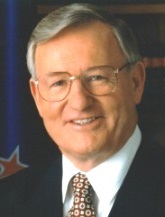 |
|
|
Premiership of Jim Bolger
|
|
|---|---|
| 2 November 1990 – 8 December 1997 | |
| Elizabeth II | |
| Cabinet | Fourth National Government of New Zealand |
| Party | New Zealand National Party |
| Election | 1990, 1993, 1996 |
| Appointer | Paul Reeves |
| Seat | Premier House |
|
← Mike Moore • Jenny Shipley →
|
|
First Term: Big Changes and Tough Decisions
Just three days after Bolger became Prime Minister, his government had to help the Bank of New Zealand with a large amount of money. This cost $380 million. Because of this, the government had to borrow more money and change its budget plans.
Bolger's first budget was called the "Mother of All Budgets." His Finance Minister, Ruth Richardson, made big cuts to government spending. These cuts especially affected health and welfare services. For example, payments for unemployed people and sick people were reduced. Payments for families were also cut, and some family benefits were stopped completely. The government also started charging for some hospital and school services that used to be free.
Another important law passed was the 1991 Employment Contracts Act. This law changed how workers and employers negotiated. It led to a big drop in the number of people joining unions. His government also passed the Building Act 1991, which some people believe contributed to later problems with poorly built homes.
Bolger did not support changing the voting system. However, despite his party's views, he held a public vote on it. In 1992, New Zealanders voted to change to the Mixed Member Proportional (MMP) system. This new system was confirmed in another vote in 1993, the same year National won the general election. Bolger was sometimes called "The Great Helmsman" for his practical approach and leadership.
Second Term: New Rules and Challenges
In the 1993 election, the National Party won again, but only by a small number of seats. This was partly because the economy had improved a little. For the first time since 1931, the election night results meant no party had a clear majority. After counting all the votes, National had just enough seats to form a government.
After this close election, Bolger said he needed to work with other political parties. He replaced Ruth Richardson with Bill Birch as Finance Minister, who was seen as more moderate. During Birch's time, spending on important areas like health and education increased. His government also passed the Fiscal Responsibility Act 1994. In 1994, Bolger suggested that New Zealand might become a republic one day, meaning it would have its own head of state instead of the British monarch.
During Bolger's second term, France started testing nuclear weapons again in the Pacific. New Zealand and other Pacific nations strongly criticised this. Bolger supported anti-nuclear protests by New Zealand sailors. His government sent a navy ship, HMNZS Tui, to help the protest boats.
Bolger's government also stopped giving out British honours in 1996. Instead, they created a New Zealand Honours System to recognise New Zealanders. Bolger once mentioned discussing New Zealand becoming a republic with Queen Elizabeth II. He said she was not surprised or worried.
Third Term: Forming a Coalition
The 1996 election was the first under the new MMP voting system. No single party won enough seats to govern alone. New Zealand First, led by Winston Peters, held the "balance of power." This meant they could choose which of the two largest parties, National or Labour, would form the next government.
In December 1996, Peters decided to form a coalition government with National. To stay in power, Bolger had to make many agreements. Peters became Deputy Prime Minister and Treasurer, a new important role. Bolger also agreed to many of New Zealand First's policy ideas. He allowed Peters to choose his own ministers from New Zealand First, which was unusual. There were some worries because Bolger had removed Peters from his cabinet in 1991 due to disagreements over economic policies. However, they worked together without major problems.
Bolger's government also made progress in settling historical issues with Māori people under the Treaty of Waitangi. These agreements aimed to fix long-standing problems about land and resource rights. This helped to bring the government and Māori communities closer.
Leaving the Top Job
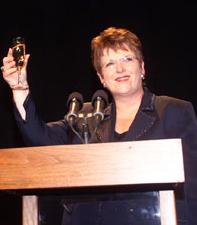
Some members of Bolger's party felt he was moving too slowly. They also thought New Zealand First had too much influence. While Bolger was away at a meeting, his Transport Minister, Jenny Shipley, planned to challenge his leadership. When Bolger returned, he found that Shipley had enough support to replace him. Instead of being voted out, he resigned on 8 December 1997. Shipley then became New Zealand's first woman Prime Minister. Bolger was given a smaller role as a junior minister in Shipley's government.
Jim Bolger was the National Party's third-longest-serving leader. A political journalist once described him as "the most under-estimated prime minister." He said Bolger had a natural ability to understand what ordinary New Zealanders wanted.
Life After Being Prime Minister
Bolger retired as a Member of Parliament in 1998. He then became New Zealand's ambassador to the United States. When he returned to New Zealand in 2001, he became the chairman of New Zealand Post, a state-owned company, and its bank, Kiwibank. He also led several other companies and advisory groups.
On 14 February 2007, Bolger was elected as the chancellor of the University of Waikato.

In 2008, the government bought back the national rail network, which Bolger's government had sold years earlier. Bolger became the chairman of the new company, KiwiRail, until 2010. Some people found this ironic, but Bolger said, "my life is full of ironies," and that "the world has changed."
Later in life, Bolger spoke about his concerns regarding poverty and inequality. He also suggested that trade unions might need more power. Some people saw this as a change from his earlier support for free-market policies. In 2021, he said that the National Party should rethink capitalism. He believed that social inequality was causing problems and that free-market capitalism was "on the verge of destroying the planet and destabilising society."
In 2018, Bolger was appointed to lead a government group looking into fair pay agreements for workers. In 2019, he retired from his role as chancellor of the University of Waikato. As of 2022, Bolger was a member of the Board of Te Urewera, a protected natural area.
Awards and Recognition
In 1977, Bolger received the Queen Elizabeth II Silver Jubilee Medal. Both Jim and Joan Bolger were awarded the New Zealand 1990 Commemoration Medal. In 1993, they received the New Zealand Suffrage Centennial Medal. In 1998, Jim Bolger was made a Member of the Order of New Zealand, which is a very high honour. Joan Bolger also received an award for her community service. Bolger received the Order of New Zealand without being given a knighthood, as he supported removing such honorary titles.
Personal Life
Jim Bolger and his wife Joan were Roman Catholics. Bolger described himself as religious but not "deeply so." They had nine children together. From 2013, the Bolgers lived in Waikanae. Jim Bolger was sometimes jokingly or fondly called the Great Helmsman.
Jim Bolger passed away from kidney failure on 15 October 2025, at the Wellington Regional Hospital in Wellington. He was 90 years old.
See also
 In Spanish: Jim Bolger para niños
In Spanish: Jim Bolger para niños
 | Frances Mary Albrier |
 | Whitney Young |
 | Muhammad Ali |


